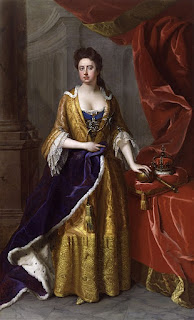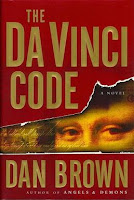In 1476 Caxton established the first printing press in England and set about printing Chaucer's Canterbury Tales, and Malory's Le Morte d’Arthur among other books. He was publisher, printer and bookseller combined. Once he had a handwritten copy of something, he owned it, never mind who actually wrote it. Quite often, the writers was already dead; but it didn't concern Caxton if they were still alive. He'd done all the work to make this a printed book, which looked comely and was easy to read, display, and store.
| The Gutenberg Bible |
For over 200 years things continued in that vein. The books a printer took off their press belonged to them for sale. The argument ran that the printer had bought the paper, and the ink, and owned the press, ergo, they owned the writing. Restrictions were enforced by the Stationers' Company, a guild of printers who were given the exclusive power to print and sell —and the responsibility to censor—literary works.
 |
| John Milton |
An act for the encouragement of learning, by vesting the copies of printed books in the authors or purchasers of such copies, during the times therein mentioned.
I. Whereas printers, booksellers, and other persons have of late frequently taken the liberty of printing, reprinting, and publishing, or causing to be printed, reprinted, and published, books and other writings, without the consent of the authors or proprietors of such books and writings, to their very great detriment, and too often to the ruin of them and their families: for preventing therefore such practices for the future, and for the encouragement of learned men to compose and write useful books; may it please your Majesty, that it may be enacted, and be it enacted by the
 |
| Queen Anne |
Queen's most excellent majesty, by and with the advice and consent of the lords spiritual and temporal, and commons, in this present parliament assembled, and by the authority of the same;
II. That from and after the tenth day of April, one thousand seven hundred and ten, the author of any book or books already printed, who hath not transferred to any other the copy or copies of such book or books, share or shares thereof, or the bookseller or booksellers, printer or printers, or other person or persons, who hath or have purchased or acquired the copy or copies of any book or books, in order to print or reprint the same, shall have the sole right and liberty of printing such book and books for the term of one and twenty years…
To read the Statute of Anne, click here.
This began the acknowledgement of an author’s ‘intellectual property’ of their writing. As soon as you have written your work – even before it reaches editor – you own its copyright. This has been extended from twenty-one years, in 1710, until, in UK and EU law today, to seventy years after your death.
An excellent example of this being tried in the courts was the case in 2006 against Anchor, the publishers of The Da Vinci Code (Dan Brown, 2003). This was brought by the authors of The Holy Blood and The Holy Grail, published in 1982. Baigent and Leigh claimed that The Da Vinci Code was an infringement of their copyright as it borrowed a lot of its fictional content from their non-fictional, heavily researched work. The case failed; it was clear there was little copying of the actual text. But it’s possibly that Baigent and Leigh knew this; the action brought their book back into the public’s attention and increased its sales. On the other hand, in 2008, Author J.K. Rowling won a copyright infringement lawsuit against Steven Vander Ark’s Harry Potter Lexicon. Rowling was quoted as saying…I went to court to uphold the right of authors everywhere to protect their own original work. The court has upheld that right. The proposed book took an enormous amount of my work and added virtually no original commentary of its own…
to read more about this case, click here
The Small Print
The UK prides itself on the freedom of speech that we enjoy (although the US, for example, offers writers a great deal more freedom than British law does). The restrictions in Britain fall into a number of categories, most of which have little bearing on the sort of writing we’re thinking about here but, like plagiarism, there are some statutes that are relevant to the professional writer. Bear in mind, it’s publication rather than writing, that generally causes the problem.
- Obscenity, blasphemy and racism. These laws are continually under review. If you think there’s any possibility that you’re contravening the law in these areas, seek advice. Start with your tutor
- National security laws relate to D-notices and the Official Secrets Act. You will be well aware if your writing contravenes these.
- Special injunctions are court orders, issued by a judge in response to a direct application. These can forbid the publication of individual articles on specific subjects
- General injunctions are permanent – for example those that prevent young criminals being named. There are also the uniquely British sub-judice rulings, which severely restrict what can be written about people charged with a criminal offence but awaiting trial, so that an unprejudiced jury can be selected
- Slander is saying untrue things about other people, which cause actual damage to their business or social standing. Slander only applies to the spoken word and therefore doesn’t need to worry you as a writer
- Libel is writing (and publishing, including online publication) untrue statements that are potentially damaging to the business or social standing of a person – ‘defamatory’ is the technical term. Unlike slander, a person suing for libel does not have to prove that any damage has yet happened, only that the statements made are potentially damaging. This acknowledges the greater power of the written over the spoken word. However, there is no law against publishing damaging statements that are true. There’s also no law against publishing statements which are untrue but not damaging (unless fraud is involved, or a form of advertisement). You have to have tell a deliberate lie, or at the very least be negligent in checking the facts, to fall foul of this law.
- Take a book by an author you admire and love to read. Read enough to immerse yourself in the writing style and the writer’s voice as well as the themes and forms that are characteristic of this author
- Put the book to one side and freewrite for twenty minutes. Allow yourself to emulate the writing you admire; this should be fairly easy if you’ve really immersed yourself in the writing
- Don’t copy any actual words from the book, but if you want to write similarly on a similar subject, feel free to do so. Put the writing aside for half an hour or so, then reread it
- Analyse the effect that this exercise had on your writing. Ask:
- Did the immersion change your voice or style?
- Did it ‘free up’ your pen?
- Did the eventual piece resemble the voice of the original author?
- To what extent?
- Is this writing plagiarism?
- What you wrote will be your own work, albeit in the style of another, so the answer to the final question should be ‘no’
- Put the writing aside again, perhaps overnight
- Reread it, then put it to one side and try to write a similar piece in your own ‘voice’
- Analyse the result as you did before. Ask:
- What changes did you observe?
- Did your writing resemble the original or were you simply influenced by it?



